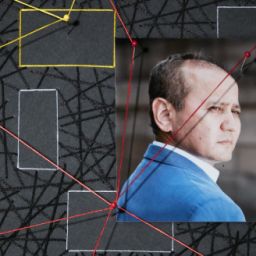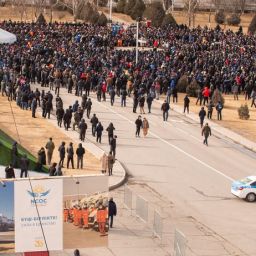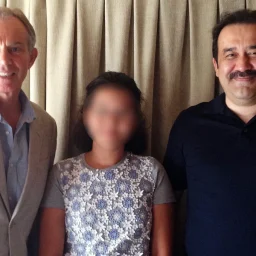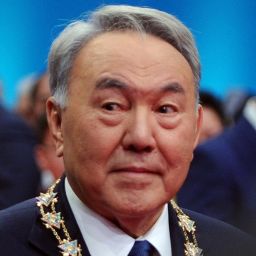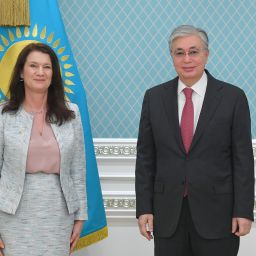Translated into English using Google Translate
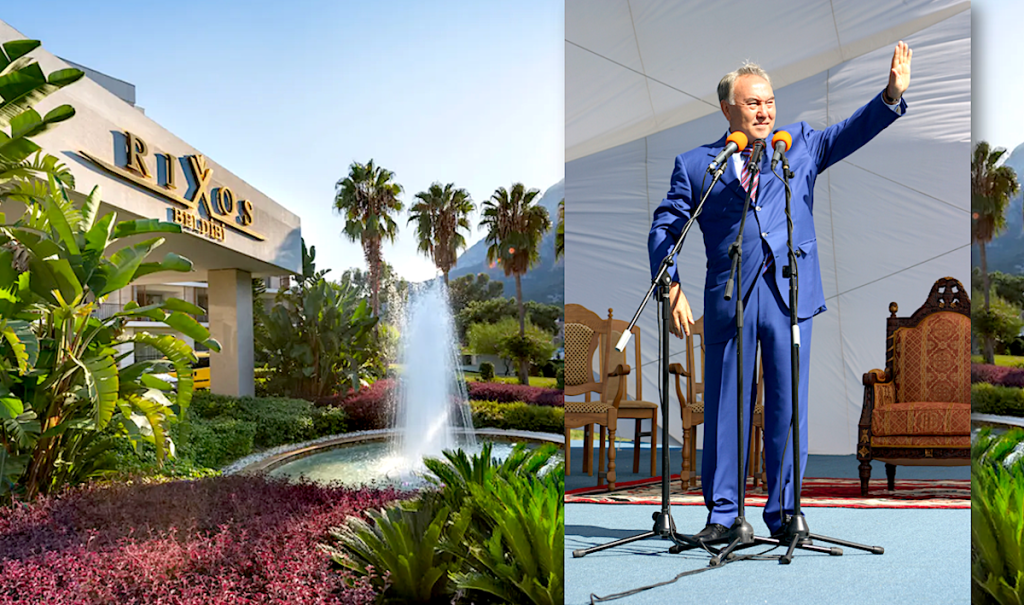
In March, the Kazakh government began the process of preparing for the sale of the Rixos Beldibi hotel on the Mediterranean coast in Turkey. The valuation of the hotel should be fully completed by the end of the month, and in May the government of Kazakhstan will put shares of the luxury hotel up for sale.
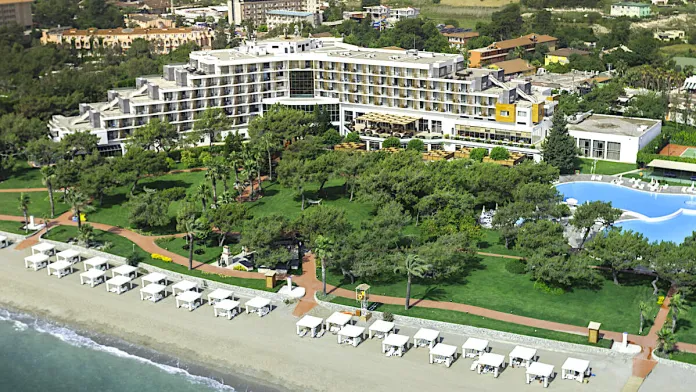
Information about this appeared on the state electronic trading platform. The chic Rixos Beldibi hotel is listed on the balance sheet of Kazakhstan’s Alatau Hotel JSC, which is almost 70% owned by the Fund of the First President of Kazakhstan, and the rest, just over 30%, belongs to the State Property Committee.
The share of the latter will be put up for sale.
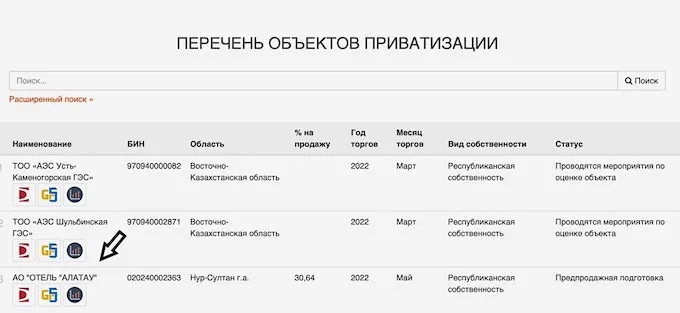

We previously wrote that Kazakhstan has owned this luxury hotel in Turkey for 17 years. About 1.7 billion tenge ($11 million at the rate of 150 tenge per dollar) was invested in its construction. However, the five-star hotel did not bring profit to Kazakhstan — only losses, that is, it was not possible to return or increase investments. Therefore, apparently, the hotel and decided to sell.
Now it is very important to ensure that the state’s share in Rixos Beldibi is not given away for next to nothing. Kazakhstanis have already spent too much on it.
How the Kazakhs built a hotel in Turkey
Let’s remember why the government of Kazakhstan decided to build a luxurious hotel, how the owners of real estate changed and what agreements had to be made with Turkey in order to legalize Rixos Beldibi in foreign territory.
27 years ago, an agreement was signed between Turkey and Kazakhstan on the transfer to use of a land plot in the Kemer district of Antalya province. The protocol was signed in Ankara on December 13, 1993. In 1996, the agreement was approved by Parliament. According to the agreement, Kazakhstan must return this land to Turkey 49 years after the entry into force of the deal.
We are talking about five hectares of land.
In the publication of the Turkish journalist Yusuf Yavuz, it is noted that the active development of the Kazakhstani section took place between 2001 and 2006.
The municipality of Beldibi approved the project for the construction of a five-star hotel in February 2001. Information about this can be found in the transcript of the parliamentary hearings, which is published here. It should be noted that there were heated discussions in the Turkish Parliament on this issue.
As soon as the hotel project was approved in Beldibi, a document was born in Kazakhstan that allows financing the construction. In the public domain, you can find Government Decree No. 935 dated July 10, 2001 “On the establishment of a closed joint stock company” Hotel “Alatau”.
The construction budget can be judged based on the size of the initial authorized capital of the Alatau Hotel company, which has always had only one asset — a hotel on the Turkish coast. This is about 3.3 billion tenge. The State Property and Privatization Committee of the Ministry of Finance of Kazakhstan owned 55% of the shares, which in monetary terms is slightly less than 1.7 billion tenge (more than $11 million at the rate of 150 tenge per US dollar).
On the gosreestr.kz website, we see figures related to Alatau Hotel JSC since 2003, and audit reports, which clearly show how the owners of real estate in Turkey have changed. And we can compare these events with the documents signed later between Kazakhstan and Turkey, and also make sure that the Rixos hotel in Beldibi does not bring dividends to Kazakhstan.
Judging by the movement of finances and some publications in the Turkish media, the hotel began operation in 2005, and in 2006 brought in an income of 181.9 million tenge (1.4 million US dollars at the rate of 125 tenge per dollar).
In the next four years, the hotel in Turkey operated at a loss (in the audit reports, the asset was called Rixos in Beldibi). The loss exceeded half a billion tenge (about 1.7 million US dollars at the rate of 150 tenge per dollar).
In 2011 and 2012, the hotel in Turkey showed a small profit — about 33 thousand US dollars.
Then the composition of shareholders changed at the hotel, and the state’s share became noticeably smaller. Here is what the 2012 audit report says about this. As of December 31, 2011, the shareholders were: the State Property Committee — 55.026% of the shares, the transnational company “Kazchrome” — 22.4% of the shares and “Enrichment” LLP — 22.4% of the shares.
But by October 17, 2012, two private companies transferred their stakes to the private Fund of the first President of the Republic of Kazakhstan.
However, the state did not long control the Alatau Hotel, and therefore Rixos. On March 1, 2013, Alatau Hotel placed an additional 2.6 million ordinary shares of one thousand tenge each for a total amount of 6 billion tenge (about 40 million US dollars at the exchange rate of 150 tenge). After this operation, the share of the private Fund of the first president increased to 69.36%, while the share of the state decreased to 30.63%.
Elbasy’s dear gift
How did the hotel, originally owned by the state, come under the control of the private Foundation of the first President of Kazakhstan? We also told this curious story in due time. Let us briefly recall the essence.
In October 2012, the Board of Directors of TNC Kazchrome JSC, which is part of the Eurasian Natural Resources Company (ENRC), without the consent of minority shareholders, decided to donate to the Pavlodar — Our Common Home NGO its solid block of shares in Alatau Hotel JSC.
The transaction for the transfer of shares worth 731.5 million tenge (at that time almost 5 million US dollars) was carried out as part of a memorandum of cooperation between the Akimat of Pavlodar region and ENRC Kazakhstan LLP (also part of the Eurasian group).
On October 15, the Pavlodar public association concluded another donation agreement No. 57 with the Fund of the First President of the Republic of Kazakhstan, undertaking to transfer the above shares to it free of charge. Which is what was done. That is, “Pavlodar is our common home” in this scheme played the role of a technical intermediary.
Why the hotel was handed over to the Nazarbayev Foundation, ERG co-owner Alexander Mashkevich explained to journalists during the signing of a memorandum between the newly created Eurasian Resource Group and the akimat of Pavlodar region.
The oligarch said that there was nothing doubtful about the donated shares of the five-star hotel in Turkey. Overseas property worth almost $5 million was given away because TNK Kazchrome JSC (part of the Eurasian group), which owned it, did not need it.
“This is not our core business, we do not deal with hotels. They (the fund) turned to us, we handed them over, — Alexander Antonovich commented on the deal with a straight face. — For us, it was a minority stake, which did not give any profit, nothing. We handed it over to people we thought would be better at managing. It didn’t matter to us.”
For the debts of the hotel paid off with land
When the state lost control of its asset in Turkey, Kazakh senators approved a draft law that stipulated some changes to the signed protocol between Kazakhstan and Turkey. This project was directly connected with the Kazakh hotel Rixos in Beldibi.
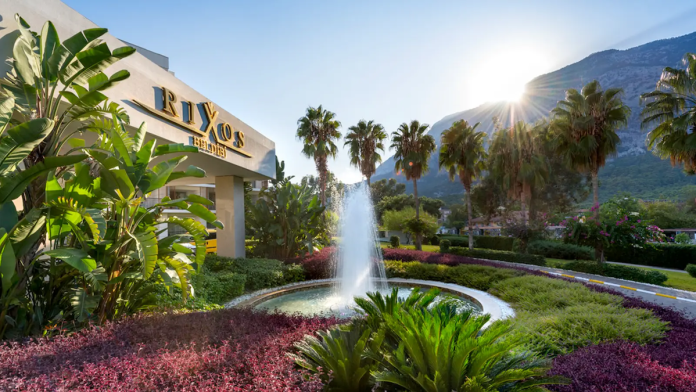
Under the project, Turkey gives Kazakhstan a forest plot with a total area of 67,256 square meters, which is located on the territory of the village of Beldibi, Kemer district in the province of Antalya. It is stipulated that part of the plot of 44,954 square meters can be used for tourism purposes (we are talking about the land on which Rixos stands). And the Kazakh side will provide the Turkish government with two land plots for use: in Aktau — with an area of 7,000 square meters and in Almaty — with an area of 1,500–2,000 square meters. The term of land use will be 49 years.
The Kazakh media disseminated this news, but the government of Kazakhstan kept silent about the fact that land in two cities of the country is leased out of tax debts to Turkey arising from the activities of the Rixos hotel.
In the public domain, you can find the Turkish version of the protocol*, which contains the details of the agreement.
Part of the land was exploited for commercial purposes, as a result of which 9,483,000 liras were not paid taxes between 2001 and 2010, which was reported to the Kazakh side …
Work to resolve the conflict continued for 7 years, and within the framework of negotiations with the Kazakh side, the current legal status of the part of the land allocated free of charge was maintained.
(…) in Ankara on April 16, 2012, the issue of how part of the land exploited for commercial purposes will be exempted from diplomatic privileges and immunities, and in exchange for the return debt associated with the operation of the hotel, the Turkish side will be allocated for 49 years for construction of public buildings and land in the cities of Aktau and Almaty…”, the agreement says.
This deal with Kazakhstan in March 2013 caused a big discussion in Turkey. Some deputies openly said that the deal was unprofitable for their country, and did not understand on what grounds the Kazakhs built the hotel in Beldibi. But the agreement was still legalized on both sides.
From 2013 to the present, the composition of the shareholders of the Alatau Hotel has not changed. The company is still controlled by Nazarbayev through his fund.
This is confirmed by a recent investigation by OCCRP journalists on the investments of the first president of Kazakhstan, which was published immediately after the events of January 2022.
Why did Nazarbayev create funds?
The Foundation of the First President of the Republic of Kazakhstan is the largest non-profit foundation in the country, established in 2000 on the personal initiative of the first President of Kazakhstan, Nursultan Nazarbayev. Initially, it was a public organization, but in 2011 it became private, and Nazarbayev has since been listed as its founder.
In 2021, the fund was closed, and after the reorganization, the shares of the Alatau Hotel came under the control of the Nursultan Nazarbayev Fund.
According to the OCCRP investigation, the Elbasy founded the Nazarbayev Foundation and the Nursultan Nazarbayev Foundation as private foundations in 2009 and 2010 respectively. And two more funds — “Demeu Fund” and “Elbasy Fund” were created in 2013 and 2021.
All of Nazarbayev’s funds have been actively investing since he left the presidency. For example, the Nursultan Nazarbayev Foundation purchased a new Airbus ACJ320neo aircraft worth more than $100 million from a Swiss airline and imported it to Kazakhstan. This fact itself is known only because the OCCRP journalists had a document on the release of the aircraft from import control.
In August 2020, what Business Insider called a “flying penthouse” plane departed Indianapolis. After landing in Zurich and Malta, he arrived at his new base in Nur-Sultan. He is now in the fleet of Berkut Air, a state-owned airline that reports to the Presidential Administration. And there is evidence that Nazarbayev uses it.
The movements of the aircraft are not displayed in most special trackers, but journalists still managed to get some information about his flights in the Open Sky Network, a non-profit organization that collects data on air traffic.
It is known that on June 30, 2021, the plane flew from Kazakhstan to Moscow. On the same day, the Kremlin announced that Nazarbayev had a “working meeting” with Russian President Vladimir Putin.
The plane also made several flights around Kazakhstan — journalists found that two of them coincide in dates with Nazarbayev’s visits to the tourist hub and to the archaeological site.
“Other purchases of Nazarbayev’s funds are no less luxurious. As with the aircraft, the source of most of the funds used to purchase them is unknown. However, several times Nazarbayev’s funds were sold to companies that had previously received funding from the government of Kazakhstan – in fact, this means that state funds have flowed into private hands,” investigative journalists write.
Among the most interesting assets of The St. Regis Astana is a hotel in the center of Nur-Sultan, which was opened in September 2017. It is part of the Marriott International group. Promotional materials praise its “prestigious location in the center of the capital.”

St. Regis is owned by the Kazakhstani company Turion Investment Group — for the construction of a hotel worth $189 million, it received a loan of $85 million from the Development Bank of Kazakhstan. This state-owned bank was created to develop non-resource sectors of the economy and at the same time repeatedly issued loans at the behest of the ruling elite.
President Tokayev also recognizes this problem. On January 11, 2022, he stated that the financial institution “has turned into a personal bank for a select circle of individuals representing financial-industrial and construction groups.”
Among the shareholders of Turion Investment Group was Timur Kulibayev, Nazarbayev’s son-in-law and one of the richest businessmen in Kazakhstan. Less than a year after the opening of the hotel, Kulibayev’s share (it is not known how much he owned) was transferred to the Demeu Nazarbayev fund.
For unknown reasons, in December 2021 they returned to the control of Kulibayev and his wife Dinara, Nazarbayev’s daughter.
Other major assets of the Nursultan Nazarbayev Foundation, according to OCCRP, include hotels, a golf club, a ballet theater and several media outlets.
It also revealed that a landscaping company owned by two of Nazarbayev’s foundations won $6.5 million in tenders between 2012 and 2018 when he was still president.
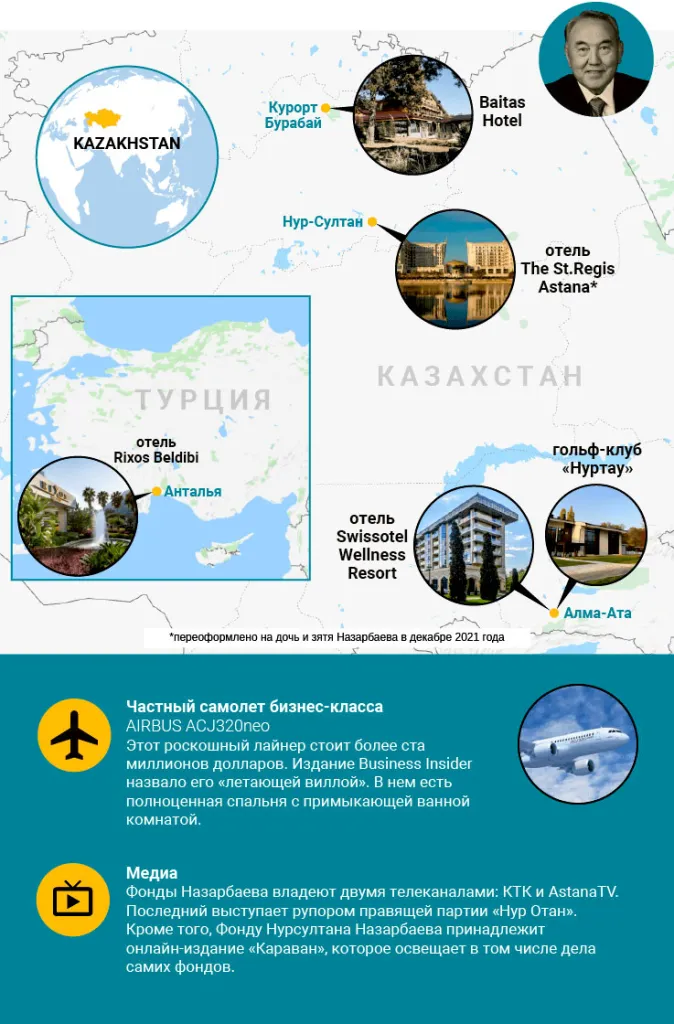
Original source of article: respublika.kz

